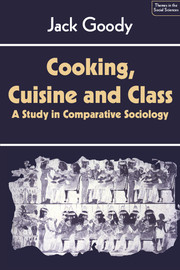Book contents
- Frontmatter
- Contents
- List of illustrations
- Preface
- Dedication
- 1 Intentions and remarks
- 2 State of play
- 3 Production and consumption among the LoDagaa and Gonja of northern Ghana
- 4 The high and the low: culinary culture in Asia and Europe
- 5 Industrial food: towards the development of a world cuisine
- 6 The impact of the world system
- 7 Cooking and the domestic economy
- Appendix: Terms, operations and cognition
- Notes to the text
- Bibliography
- Index
- BY THE SAME AUTHOR
5 - Industrial food: towards the development of a world cuisine
Published online by Cambridge University Press: 05 June 2012
- Frontmatter
- Contents
- List of illustrations
- Preface
- Dedication
- 1 Intentions and remarks
- 2 State of play
- 3 Production and consumption among the LoDagaa and Gonja of northern Ghana
- 4 The high and the low: culinary culture in Asia and Europe
- 5 Industrial food: towards the development of a world cuisine
- 6 The impact of the world system
- 7 Cooking and the domestic economy
- Appendix: Terms, operations and cognition
- Notes to the text
- Bibliography
- Index
- BY THE SAME AUTHOR
Summary
The British diet, claims the modern ‘Platine’, went straight ‘from medieval barbarity to industrial decadence’. With the general sentiment one has some sympathy. But as we have seen, medieval barbarity meant culinary differentiation, if not into something as grand as a sophisticated cuisine such as the French established in building on firm Italian foundations, at least into systems of supply, preparation, cooking, serving and consumption of food that resolutely set aside the high from the low. And ‘industrial decadence’, whatever its consequences for the haute cuisine (larks' tongues are not promising ingredients for a mass cuisine, canned food is not always the best basis for a gourmet meal), has enormously improved, in quantity, quality and variety the diet (and usually the cuisine) of the urban working populations of the western world. It is also making a significant impact on the rest of the world, initially on the productive processes, some of which have become geared to supplying those ingredients on a mass scale, and more recently on consumption itself, since the products of the industrial cuisine and of industrialised agriculture are now critical elements in the food supply of the Third World.
But before we consider the impact on the particular corner of the world on which we are concentrating, we need first to look at the world context in which those changes took place, at the rise of an industrial cuisine in the West.
- Type
- Chapter
- Information
- Cooking, Cuisine and ClassA Study in Comparative Sociology, pp. 154 - 174Publisher: Cambridge University PressPrint publication year: 1982
- 1
- Cited by



